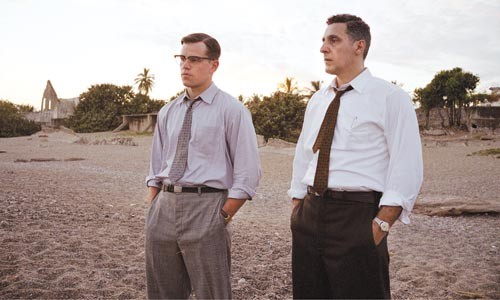Midway through The Good Shepherd, I began to wonder why a film about the birth of the Central Intelligence Agency would interest an actor like Robert DeNiro, who, for only the second time in his career, has chosen to work as a director. Sure, he's Fockered around with CIA comedy. But this is a long, tense, deliberate drama-cum-thriller, with politics and history at its core.
Slowly, though, we understand. As the Cold War emerges from the rubble of World War II, and as the Russians and the Americans turn suspicion into Murder Inc., the whole affair takes on the air of The Sopranos: This is a story of two mob families, and the moral and emotional decay their rivalry causes.
What can we make of a movie that reveals to us, as last, why the Bay of Pigs invasion failed (a lovesick boy lets the plan slip while bedding a beautiful spy)? Ultimately, The Good Shepherd is hardly political, except to tell us that our government occasionally tortures and kills in the name of national security. Film at 11, although it's been in all the papers. But without some palpable context -- that is, without making us genuinely fear the Cold War -- this is all just melodrama, although often an absorbing entertainment.
It begins well, with Edward Wilson (Matt Damon) studying poetry at Yale, performing in drag as Little Buttercup, then asked to join the Skull and Bones. This initiates his taste for circles of power and introduces the drama's central theme of loyalty and trust (for Wilson, it goes back to his dead father, of course). Do newly recruited Bones really mud-wrestle naked while the older guys piss on them from the balcony? If so, then that explains why they throw such great reunions: How many soirées does it take to make amends for giving your brother a golden shower? This group even sets a place for you at the table after you're dead.
While he's still at Yale, in 1939, Wilson gets asked by a well-dressed FBI agent (Alec Baldwin, almost parodying himself) to spy on his beloved mentor (a much-welcomed Michael Gambon), who holds meetings of an American group that supports the increasingly dangerous Führer over in Germany. The good professor, an Englishman, is soon deported.
But guess what: He was actually a British counterintelligence officer, trying to uncover Nazi sympathizers. Thus Wilson learns about the yin and the yang of espionage: The same instinct that senses deception also clouds judgment. This lesson will assail him throughout the movie, long after he gets it, just to make sure we do as well.
The Good Shepherd takes place on a big canvas, although it's hardly "Guernica": The soundtrack, while low-keyed, is still incessant, like a ringing in your ears that you can barely live with, and Eric Roth's screenplay whispers its few ideas over and over. His best line comes at the end, when someone explains why spies never use the definite article before CIA: "Do you put the word 'the' before God?"
After college, Wilson impregnates the daughter (Angelina Jolie) of a senator, marries her, then goes off to Europe to spy on Germany for the OSS. Back home he's naturally a top recruit for a new agency formed to spy on our new enemy, the Russians. The general (DeNiro, in a small role) who comes up with CIA is a decent man who "always seems to err on the side of democracy." So he creates civilian oversight for the agency and forbids it to spy on U.S. soil. He's also slowly losing his feet and legs to diabetes, clearly a metaphor, and a good one, for Gen. Frankenstein's diminishing control over the monster.
DeNiro directs it all smartly, seriously and without showing off. Damon is respectable in his demanding role, but he's such a featureless actor that he shouldn't play sullen, ponderous characters like this one. He's best when he's talkative or thoroughly engaged. The Good Shepherd has a strong supporting cast (Billy Crudup, William Hurt, John Turturro, Gabriel Macht, numerous others) of spies, politicians, foreigners and bureaucrats. Best of all is Joe Pesci in a one-scene cameo as an Italian mobster. His racist epithet is deftly offset when Wilson ups the ante of racism on behalf of the entire U.S. government. It's a great moment, one of only a few in The Good Shepherd, which could have been an entire HBO series, developing its ciphers into people, and telling its history in full body. 















